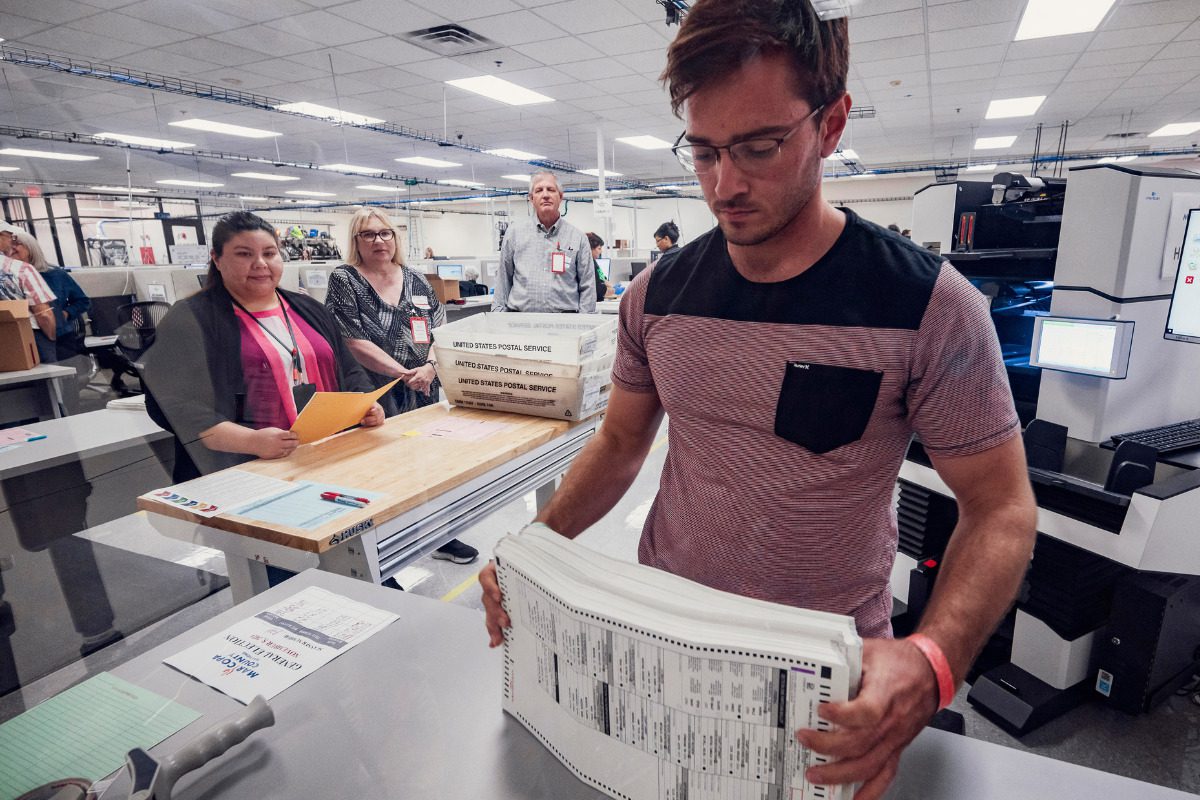
An election worker processes a stack of 2024 General Election ballots with the tabulation machine in front of observers from different parties at the Maricopa County Tabulation and Election Center (MCTEC) in Phoenix, Arizona, on October 23, 2024. Photo by Olivier Touron / AFP via Getty Images.
Maricopa County election officials announced last month that it could take nearly two weeks to count every ballot cast in Tuesday’s election.
Just like always.
A clear picture of which statewide candidates win in Arizona is not clear until Maricopa County, home to over 60% of the state’s population, releases its official results. A review of the county’s election results by The Copper Courier dating back to 2000 found that it takes an average of 14 days to tally election results in their entirety. The fastest official results were released was six days in 2002, and took 20 days for every major election from 2008 to 2012.

While the November Election does have a few new time-consuming complications—two-page ballots that take longer to process, as well as a new law requiring counties to hand count a portion of ballots—elections officials remain undaunted. Maricopa County Supervisor Bill Gates said that election staff have planned carefully on how to run the election efficiently and is confident they will do so.
“This is an extremely important election. There’s a lot of interest in it,” said Gates. “[Elections Director] Scott Jarrett has put together a plan that assumes a very significant number of people voting both early and on Election day. So it’s not like this is a surprise that this is a big election, we all understand that.”
Unofficial versus official election results
Even though the official results have always been released a week or more after the election, how quickly races used to be called created a perception that Arizona’s results came in quickly. Until 2016, Arizona was a solidly Republican state, and the winner of most major races could be determined based on the initial results released on Election Day.
That changed in 2016, when Arizona’s election results weren’t called for two days. A small departure from the norm that went largely unnoticed as Arizona wasn’t considered a swing state at the time. Donald Trump had already won enough states to secure the presidency on the night of the election, rendering Arizona’s results in that race irrelevant.
That number jumped to six days in 2018, as voters across the state watched anxiously as state superintendent candidates Kathy Hoffman and Frank Riggs overtook the others’ lead daily. The unease was magnified as millions refreshed election results between US Senate candidates Kyrsten Sinema and Martha McSally.
But the official results took 14 days to tally, right on schedule.
What to expect
The 2024 election is on track to look more like 2018 than 2020, when both the unofficial and official results were declared sooner than expected. Any concrete results on Election Day is nearly impossible, as a new law that requires a hand count of all ballot envelopes dropped off at every polling place before they are sent to ballot processing center is expected to cause severe delays.
Counting ballots before tallying votes could delay initial results by several hours and will reduce the number of votes that can be counted that night. Jennifer Liewer, communications director for the Maricopa County Attorney’s Office, told Votebeat that the hand count makes it pointless to try and estimate when initial results will be available.
“As soon as I give a time, I will be held accountable for it until the end of time,” said Liewer. “The new requirement to count affidavit envelopes is too big of a factor to make a prediction.”
Elections departments have increased staff to ensure the hand counts don’t delay the official results and are confident they will deliver the results to the Arizona Secretary of State in time for statewide certification on November 25.
Support Our Cause
Thank you for taking the time to read our work. Before you go, we hope you'll consider supporting our values-driven journalism, which has always strived to make clear what's really at stake for Arizonans and our future.
Since day one, our goal here at The Copper Courier has always been to empower people across the state with fact-based news and information. We believe that when people are armed with knowledge about what's happening in their local, state, and federal governments—including who is working on their behalf and who is actively trying to block efforts aimed at improving the daily lives of Arizona families—they will be inspired to become civically engaged.


Republican Rep. Juan Ciscomani wins reelection to Arizona US House seat
Juan Ciscomani won his first term in 2022 when he beat Kirsten Engel by over 5,200 votes. PHOENIX (AP) — Republican Rep. Juan Ciscomani won...

No, Elon Musk did not hack Arizona’s election results with Starlink
Only three Arizona counties use Musk's Starlink, and two of them voted for Kamala Harris. As President-elect Donald Trump begins filling key posts...

Why AP called the US Senate race in Arizona for Ruben Gallego
The AP only declares a winner—in this case, Ruben Gallego—once it can determine that a trailing candidate can’t close the gap and overtake the vote...

Women have led other democracies, but US voters rejected the 2 who tried—what will it take to elect a female president?
In the United States, 45 men have served as president, starting with George Washington in 1789. Donald Trump’s reelection extends that streak....





